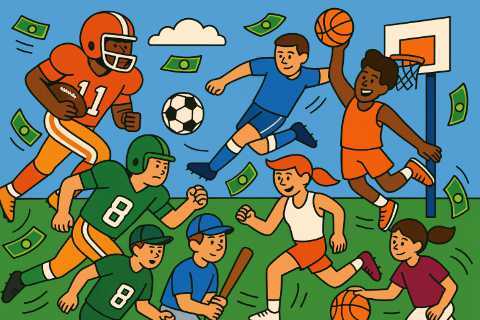
Posted by - News Staff![]() \
\
November 15, 2025 \
Filed in - Sports \
Sports-betting Professional Sports Gambling \
516 views \ 0 reviews
JTFmax: OP
THE HOUSE ALWAYS WINS: HOW SPORTS LOST ITS SOUL TO GAMBLING
Expanded Investigative Feature — Sarcastic, Serious, and Uncomfortably True
There was a time when sports were sacred. Stadiums were temples, athletes were heroes, and the only thing fans risked losing was their voice from screaming too loud. Then the gambling industry broke down the gates with billions in cash and the irresistible promise of “engagement.” That word used to mean a ring and a lifetime commitment. Now it means tapping an app while your team falls apart — and your bank account goes with it.
Since legalization exploded in 2018, Americans have placed nearly $450 billion in legal sports bets. Add the offshore books, crypto casinos, underground bookmakers, and whatever cash disappears into the digital shadows on a Sunday afternoon, and the real number approaches $600 to $700 billion. The house’s portion — the so-called hold — is now well into the tens of billions. To put that into perspective, the sports betting industry makes more money than the NFL salary cap for all 32 teams… combined.
The bettors, of course, lose almost exactly what the house gains. The average sports bettor now spends over $3,200 a year, which is funny because that’s also the average amount they regret spending. People talk about their wins like they climbed Everest, but nobody posts screenshots of the $300 they lost on a “can’t miss” same-game parlay at 11:38 p.m. on a Tuesday.
This wasn’t an accident. It wasn’t natural evolution. It was a takeover — fast, intentional, and incredibly profitable.
Professional sports saw the cash tsunami coming and decided to surf it straight to the bank. Leagues that once suspended players for merely walking into a casino now ink sponsorship deals with betting companies the size of small nations. Basketball courts feature betting logos. Football broadcasts show live odds on screen. Commentators run through prop bets like they’re discussing nutrition labels. Even baseball — America’s church of tradition — is now sponsored by the very industry once treated like a plague.
And the athletes? They’re drowning in temptation. With live prop bets, all it takes is one intentional foul, one bad pass, one missed free throw, and a player can move millions in betting volume. Small actions with big consequences — sometimes irresistible consequences.
The scandals keep coming. NFL players banned for betting on their own teams. NBA starters expelled for manipulating their own in-game stats. College coaches fired in the middle of the night after betting patterns on obscure games suddenly spike like someone hit a switch.
But the most disturbing chapter is the quiet infiltration into college and youth sports. College athletes — teenagers, essentially — live under surveillance for grades, coaches, Twitter posts, even socks that don’t match the uniform. But they’re surrounded by classmates placing bets, boosters whispering tips, and offshore books posting odds on their games before they even finish warmups.
Entire college locker rooms have been investigated. Volleyball, baseball, tennis — sports that once inspired wholesome family road trips — now see betting action from offshore gamblers who can’t even name the state the school is in.
And then there’s the truly dark part: gambling markets for high school games. Yes, high school. Offshore sportsbooks have posted odds on teenage soccer matches, youth basketball tournaments, and under-17 club championships. Imagine being a 15-year-old and having some faceless gambler in the Philippines betting on your free throws. Imagine receiving a DM offering $500 to “just miss a shot or two.” Some kids say no. Some don’t. All of them are being exploited.
This isn’t just a sports problem — it’s a human one. Studies show a direct link between sports betting and rising credit card debt, declining credit scores, and disappearing household savings. For every dollar spent on betting, families invest two fewer dollars in savings. People aren’t losing money to “bad luck.” They’re losing money to a system engineered with the precision of a casino, the psychology of social media, and the reach of a global tech empire.
Sports didn’t die. But its soul wandered off somewhere behind the neon ads, the nonstop odds, the euphoric wins and the devastating losses. Today, the game exists to service the betting economy — a machine that never sleeps, never apologizes, and never stops taking.
What was once entertainment is now a marketplace. What were once athletes are now economic instruments. What were once fans are now data points and credit lines.
The scoreboard still lights up, the crowd still roars, and the athletes still give everything they have. But behind the spectacle, a far more powerful game is being played — one where the house always wins, and everyone else eventually pays the price.

Desert Local News is an invitation-only, members-based publication built on fact-checked, non-biased journalism.
All articles are publicly visible and free to read, but participation is reserved for members—comments and discussion require an invitation to join.
We cover local, state, and world news with clarity and context, free from political agendas, outrage, or misinformation.
Comments